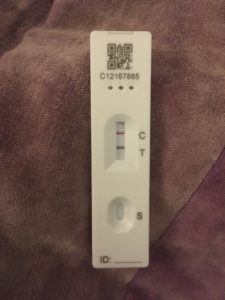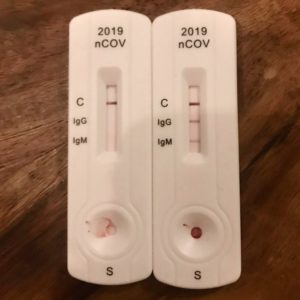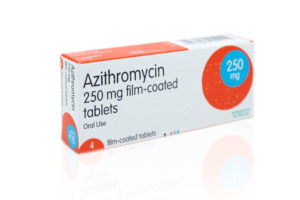More people in England at high risk from Covid-19 will get priority access to vaccines thanks to new technology developed by a University of Oxford-led team of researchers that can identify those who may be most vulnerable to the virus. Research led by Professor Julia Hippisley-Cox in the ... READ MORE
News for Translational Data Science
Tocilizumab found to reduce deaths in hospitalised COVID-19patients
The RECOVERY Trial, the world’s largest randomised trial of potential COVID-19 treatments, has found that the anti-inflammatory drug, tocilizumab, reduces the risk of death when given to hospitalised patients with severe COVID-19. The trial, which received core funding from the NIHR Oxford ... READ MORE
Lateral flow devices found to be useful in screening OUH staff for coronavirus
Infection prevention and control clinicians and researchers at Oxford University Hospitals (OUH) have been outlining the OUH’s experience of deploying self-administered home-based lateral flow testing of its staff. In a letter published in the Journal of Infection, they said that 46,503 ... READ MORE
Fewer colorectal cancer diagnoses reported during COVID-19
University of Oxford researchers from the UK Colorectal Cancer Intelligence Hub have been investigating how the diagnosis and treatment of colorectal cancer patients has been affected by the COVID-19 pandemic. The NIHR Oxford BRC-supported researchers at the Nuffield Department of Population ... READ MORE
Lateral flow devices detect most infectious COVID-19 cases, study shows
Researchers from the University of Oxford, working with Public Health England, have used NHS Test and Trace data to find out why some individuals pass COVID-19 on to their contacts more easily than others, and if lateral flow tests are sufficient in detecting those who are most ... READ MORE
Trial finds no benefit from azithromycin in hospitalised COVID-19 patients
The RECOVERY Trial, the world’s largest randomised trial of potential COVID-19 treatments, has found no convincing evidence that that the widely used antibiotic azithromycin has any meaningful clinical benefits for patients who have been hospitalised with COVID-19. Azithromycin was regarded a ... READ MORE
AI test rules out a COVID-19 diagnosis within one hour in A&E
An artificial intelligence test has been shown to be able to rapidly screen patients arriving in emergency departments for COVID-19, using clinical information routinely available within the first hour of coming to hospital. Results of the CURIAL study, published in The Lancet Digital Health, ... READ MORE
Key step for hepatitis research as patient database created
For the first time, a comprehensive database comprising an initial cohort of more than 1,300 patients with chronic hepatitis B or hepatitis C infections has been developed for potential future research into the conditions. The methodology to develop a pipeline to collect and manage this data ... READ MORE
Hidden lung damage from COVID-19 revealed in new study
Early findings from a study into longer-term damage in patients recovering from COVID-19 suggest that cutting-edge scanning techniques may detect previously unseen lung damage. The research by the universities of Oxford and Sheffield is the first in Europe to use hyperpolarised Xenon gas with MRI ... READ MORE
Prior COVID-19 infection offers protection from re-infection for at least six months
A new study suggests that individuals who have previously had COVID-19 are highly unlikely to contract the illness again, for at least six months following their first infection. The study, done as part of a major collaboration between the University of Oxford and Oxford University Hospitals (OUH) ... READ MORE
COVID antibodies wane within months, healthcare workers study shows
Antibodies to COVID-19 fall by half in less than 90 days, and antibody levels peak lower and fall faster in younger adults, an ongoing study of staff at Oxford University Hospitals NHS Foundation Trust has revealed. The findings, published on the pre-print server medRxiv, also showed that ... READ MORE
Hydroxychloroquine does not benefit hospitalised COVID-19 patients, RECOVERY Trial finds
Oxford scientists have confirmed that there is no clinical benefit from using hydroxychloroquine on COVID-19 patients in hospital. The findings were published in the New England Journal of Medicine. Hydroxychloroquine was one of the potential COVID-19 treatments being studied as part of the ... READ MORE
Hospitalised COVID-19 patients ‘younger and healthier than flu patients’
Patients hospitalised with COVID-19 were more likely male, younger and - in the US and Spain - had fewer comorbidities and lower medication use than hospitalized influenza patients according to a study published by the Observational Health Data Sciences and Informatics (OHDSI) community. This ... READ MORE
RECOVERY Trial to test ‘antibody cocktail’
The RECOVERY Trial, the world’s largest randomised trial to find effective COVID-19 treatments, will evaluate the impact of an anti-viral antibody cocktail developed to tackle the virus. The announcement was made on 14 September by Regeneron Pharmaceuticals and the University of Oxford, which ... READ MORE
Eight BRC projects get RCF funding
Eight Oxford BRC proposals, many covering a number of themes, have been awarded NIHR Research Capability Funding (RCF) funding to take forward key areas of research. The selected projects that will be supported include: Developing a research centre devoted to urgent and acute careThe ... READ MORE
Low-dose corticosteroids found to reduce mortality in patients with severe COVID-19
Oxford patients, clinicians and researchers have contributed important data to new global research which shows that corticosteroids can significantly improve outcomes for severely ill patients with COVID-19. Four research papers published today in the Journal of the American Medical Association ... READ MORE
Hydroxychloroquine study finds increased cardiovascular risk with azithromycin
The combination of hydroxychloroquine (HCQ) and azithromycin (AZM) has been linked to significant cardiovascular risks, including mortality, in the largest safety study ever performed on both HCQ and HCQ+AZM. This network study, led by the Observational Health Data Sciences and Informatics ... READ MORE
Common heart medication does not increase risk of COVID-19 hospitalisation
A study by Oxford researchers, supported by the NIHR Oxford Biomedical Research Centre (BRC), found that ACE inhibitors and ARBs – both common treatments for high blood pressure and heart failure – are not generally linked to an increased risk of severe COVID-19 disease or an increased likelihood of ... READ MORE
Mild COVID-19 symptoms might not result in positive antibody test, research finds
Oxford researchers have found that COVID-19 antibody tests might not give a positive result if people have only had mild symptoms, like loss of taste and smell. Microbiology and data experts from the Oxford University Hospitals (OUH) NHS Foundation Trust and the University of Oxford made the ... READ MORE
AI test identifies COVID-19 within an hour in emergency departments
University of Oxford scientists specialising in infectious disease and clinical machine learning have developed an artificial intelligence test that can rapidly screen for COVID-19 in patients arriving in emergency departments. The initial findings of the ‘CURIAL’ AI test, which has been ... READ MORE













